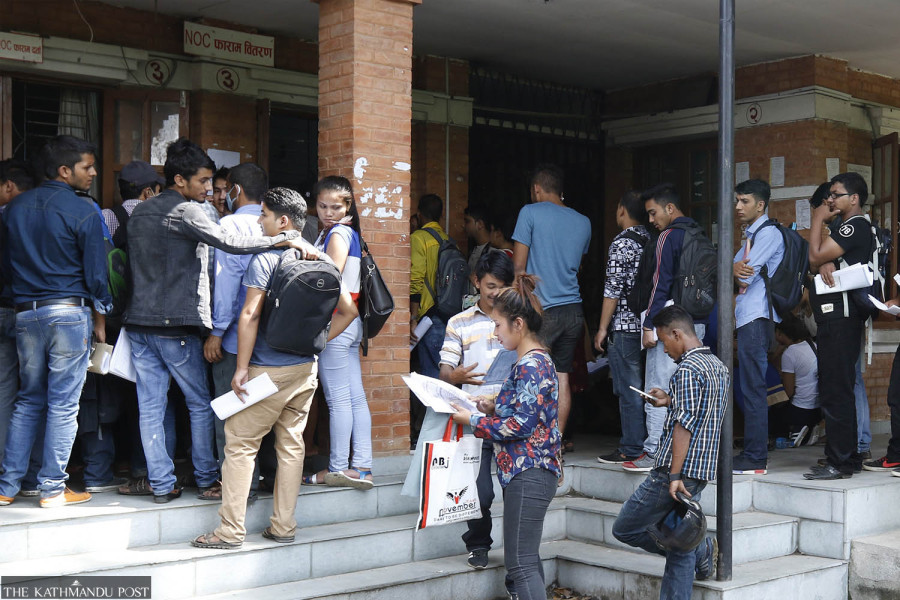Columns
A wake-up call
We must ensure that the Kalinga Institute of Industrial Technology tragedy is never repeated.
Pushpa Raj Joshi
The tragic death of Prakriti Lamsal, a Nepali student pursuing Computer Engineering at Kalinga Institute of Industrial Technology (KIIT), India, under suspicious circumstances in her hostel room, has shaken the entire nation. This incident has sparked a serious debate on whether the Ministry of Education should reconsider its policy on issuing No Objection Certificates (NOC) to students aspiring to study abroad. Every academic season, predatory intake events organised by foreign universities, particularly some Indian institutions, are common in Nepal’s major cities. Such large-scale enrollment, leading to many young and vulnerable Nepali students going to India, would not have been possible without tacit approval from our authorities.
Nepali students constitute the largest group of international students in Indian academic institutions. According to Statista, a global data and business intelligence platform, 13,126 Nepali students were enrolled in Indian institutions in 2022. This number is believed to be even higher, as many students study in India without obtaining an NOC from the Ministry of Education.
Despite their significant intellectual and financial contributions to Indian academia, Nepali students are often treated as inferiors. While many incidents of discrimination go unreported, social media has helped bring out the injustice of certain Indian academic institutes towards them. A recent viral video clip amid the KIIT fiasco, featuring two staff members, exemplifies this condescending attitude. One of them claimed that KIIT’s annual turnover surpasses Nepal’s national budget. Such a remark is not only dismissive but also deeply offensive. Moreover, security guards and external bouncers have been seen mercilessly beating Nepali students, forcibly packing them into buses and transporting them to railway stations and bus stands. Their only ‘mistake’ was demanding a free and fair investigation into Prakriti’s death and seeking justice.
Unfortunately, the cries and pleas of Nepali students at KIIT did not immediately reach the ears of our government. Only after the opposition raised the issue in Parliament did the prime minister’s message surfaced on social media, and two staff members from the Nepali Embassy in New Delhi were deployed to KIIT to ensure the safety of Nepali students. But was that enough? No. By then, many Nepali students had already left for home, and those who remained had been silenced.
The government is directly responsible for the safety and well-being of these students. Yet, disappointingly, our leaders have failed to take decisive action. The KIIT administration reportedly threatened the afflicted students, warning that their future job placements in industries would be jeopardised. Currently, the KIIT administration is focused on damage control, apologising to Nepali students while prioritising the preservation of its reputation over genuine accountability. Despite KIIT’s claims that most Nepali students have returned or are en route to Odisha, the reality is different—only 182 Nepali students out of 1,169 remain at KIIT, according to the Nepalese Embassy in New Delhi.
Meanwhile, a press conference held by a group of KIIT returnees has exposed serious unlawful activities within KIIT’s premises. Despite its responsibility, the government has not officially addressed the students' genuine concerns. A promising development, however, is that Purbanchal and Tribhuvan universities have offered KIIT returnees the opportunity to transfer academic credits and resume their studies in Nepal. This initiative should be formally implemented to safeguard the academic future of affected students.
The unfortunate incident highlights the urgent need for Nepal’s education authorities to reassess policies that impact our students’ safety, dignity and future abroad. More importantly, we must strengthen our academic institutions to retain our students. Existing universities, including Tribhuvan University and Kathmandu University, must be upgraded, with affordable modern and industry-relevant courses integrated into the curriculum. The pervasive politicisation of universities must be prevented, ensuring that academic institutions function as learning centres rather than political battlegrounds.
Instead of relying on academicians affiliated with political parties, a high-level team of independent and experienced Nepali scholars from within Nepal and abroad should be formed to draft a forward-thinking education policy. However, with the current political landscape dominated by biased and self-serving policymakers, such a transformative initiative is still a distant reality.
Through my experience in completing my senior secondary education in India, I witnessed that most Indians were respectful towards Nepali students, unlike the behaviour displayed by the KIIT staff members. During my time at the esteemed Maharishi Vidya Mandir in Lucknow, I always felt welcomed. However, that was many years ago.
Our government's credibility is declining, and our nation is gradually losing the stance it once held in the international community. However, no nation’s citizens deserve to be disrespected and abused, especially in an educational institute where they have put their trust in and pay fees. The KIIT tragedy should be the last ordeal a Nepali student faces abroad. Our policymakers must take this unfortunate incident as a wake-up call and prioritise national prosperity over their petty personal interests. Ensuring a safer and stronger academic future for Nepali students within Nepal and abroad would be the most meaningful tribute to Prakriti Lamsal.




 19.12°C Kathmandu
19.12°C Kathmandu















